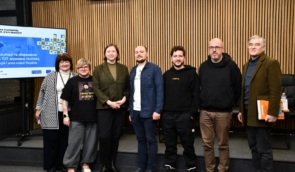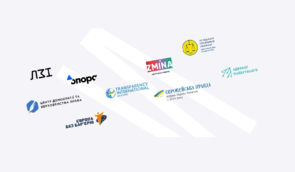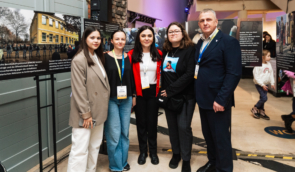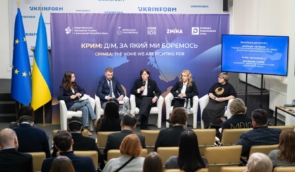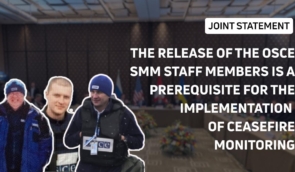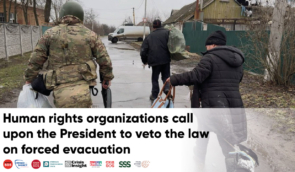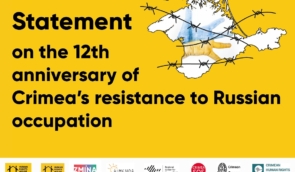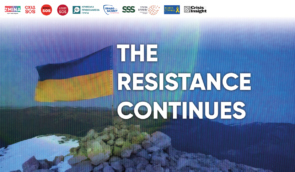Gender, Equality and the EU: ZMINA presented its Shadow Report at the National LGBTQI+ Conference
On 27 November 2025, as part of the 18th National LGBTQI+ Conference, the Human Rights Centre ZMINA held a public discussion “Gender, Equality and the EU. Recommendations from the Shadow Report”, which focused on key issues highlighted in the Shadow Report, including the need to adopt laws on registered partnerships and hate crimes.
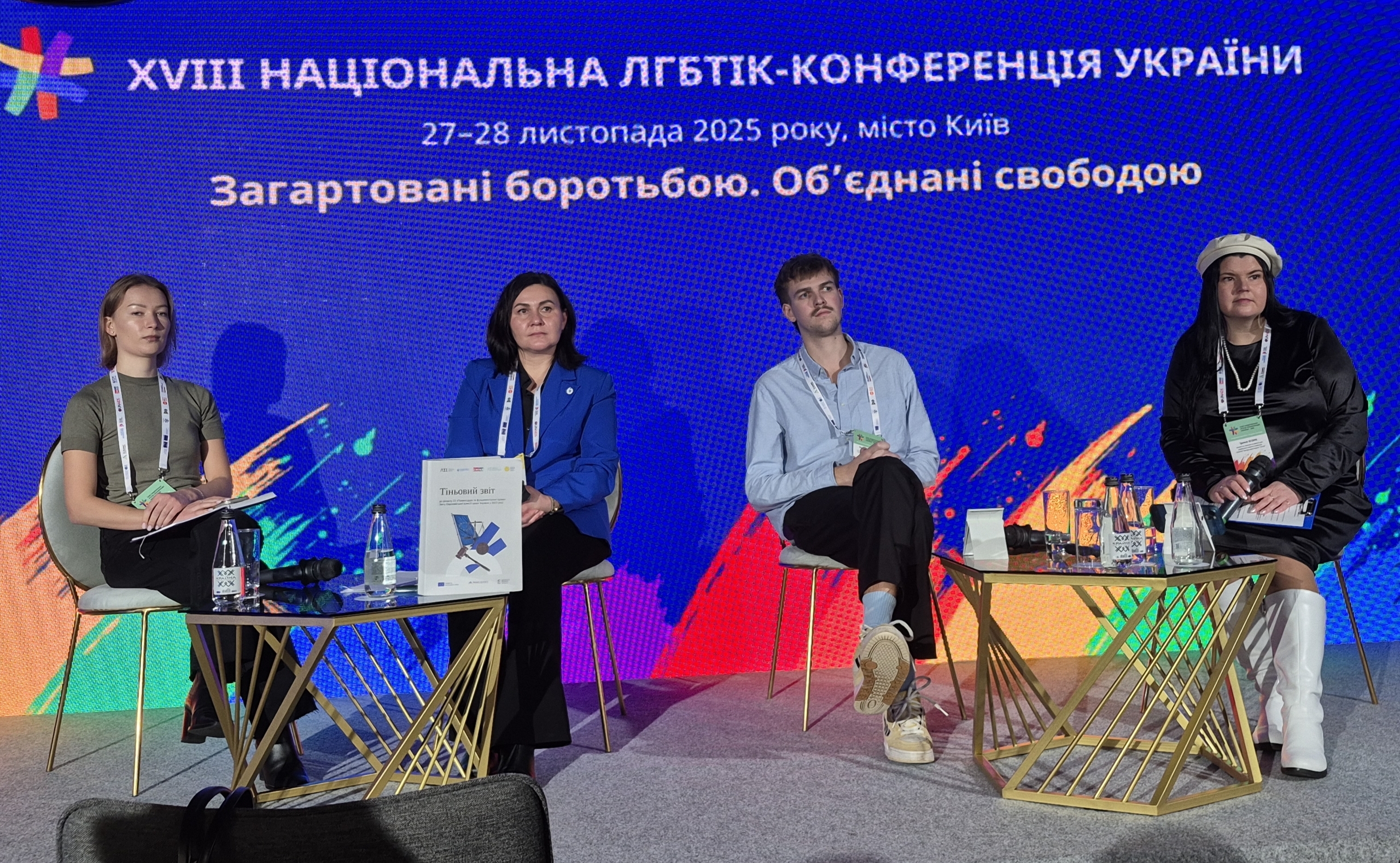 Photo: Anastasiia Datsiv, Yana Nesterevych, Oleh Maksymiak, Iryna Yuzyk. Photo credit: Vlad Kuzmenko
Photo: Anastasiia Datsiv, Yana Nesterevych, Oleh Maksymiak, Iryna Yuzyk. Photo credit: Vlad KuzmenkoThe panel was moderated by Iryna Yuzyk, a feminist, equality activist, and project manager of the Human Rights Centre ZMINA.
The speakers:
- Anastasiia Datsiv, Advocacy Manager of the Human Rights Centre ZMINA;
- Oleh Maksymiak, Advocacy Manager of the NGO Fulcrum UA, author of part of the Shadow Report on Gender Equality and the Protection of the Rights of LGBTQI+ People;
- Yana Nesterevich, Deputy Head of the Department for Equal Rights and Prevention of Discrimination of the Secretariat of the Ukrainian Parliament Commissioner for Human Rights.
Anastasiia Datsiv presented the Shadow Report to the audience, illustrating how the state is progressing on the path towards European integration.
“The Shadow Report is a common practice for countries seeking to join the European Union and already have candidate status. This is the second shadow report for Ukraine. The first was prepared last year, after Ukraine received candidate status in 2022. This document assesses not only successes but also problems that need to be solved in order to move forward,” she said.
The authors of the Shadow Report are representatives of civil society: the Agency for Legislative Initiatives, Transparency International Ukraine, the Human Rights Centre ZMINA, Tomorrow’s Lawyer, the Ukrainian Bar Association, Europe Without Barriers, and European Pravda.
Each organisation is responsible for its own part of the work.
Last year’s report was about 500 pages long, while this year’s is over a thousand.
Last year, the analysis covered only Chapter 23 of the negotiating framework — “Justice and Fundamental Rights”. This year, Chapter 24 — “Justice, Freedom and Security” — was added.
The ZMINA team focused on a large section on equality, non-discrimination and human rights, taking into account the experience of the Office of the Ombudsman, as well as issues of national minorities, property rights (particularly important in the context of full-scale war), the rights of asylum seekers, etc.
“In Chapter 23 alone, we prepared about 190 recommendations, and in Chapter 24, about 40. In total, the document contains more than 500 recommendations from all organisations,” added Datsiv.
These are recommendations for institutional changes, analysis of current legislation, assessment of draft laws, as well as proposals on which laws should be updated, adopted or repealed.
At the invitation of ZMINA, the NGO Fulcrum UA, namely Tetiana Kasian, Executive Director, and Oleh Maksymiak, Advocacy Manager, joined the work on the Shadow Report in the section on gender equality and the rights of the LGBTQI+ community. Oleh previously worked for some time in the Parliamentary Committee on Law Enforcement, where he dealt with issues of gender equality and the protection of LGBTQI+ rights and participated in the development of relevant draft laws.
“Sometimes people ask whether the shadow report is a criticism of the authorities — no, not at all. Our task was not to criticise or justify state bodies, but to provide a professional, unbiased assessment: what has been done, what needs to be improved, and what has been ignored. We communicated constantly with both independent experts and specialists working in state structures,” he explained.
 Photo credit: Vlad Kuzmenko
Photo credit: Vlad KuzmenkoThis year, representatives of the Fulcrum UA chose to work based on last year’s report. It already had a clear structure and sections, which made it possible to compare the “before/after” situation and record the dynamics. They involved several experts from various fields — from the government, parliament, and the civil society sector. According to Maksymiak, the overall picture is as follows: there are noticeable positive changes, but there is also stagnation and weaknesses. On the positive side, a mechanism for urgent reparations for victims of domestic violence has been put in place, and the number of women in leadership positions in the government has increased. At the same time, women’s representation in the media remains low (at 20-35% depending on the media outlet), and several key provisions of the Istanbul Convention have still not been implemented.
Deputy Head of the Department for Equal Rights and Prevention of Discrimination of the Secretariat of the Ukrainian Parliament Commissioner for Human Rights, Yana Nesterevych, who also participated in the event, believes that the Shadow Report is about strategic vision: how ready our state is to ensure the rights of every person.
“The position of the Commissioner and our Office is not only to interact with the authorities, but also to cooperate continuously with experts, civil society organisations and citizens. That is why the Shadow Report is an important resource for us. It provides data, highlights problems and threats, and outlines directions for further action. The analytics and recommendations from the report — both the previous and current ones — are definitely taken into account in our work,” Nesterevych noted.
According to her, the institution is already moving towards implementing some of the recommendations. In particular, it is participating in the implementation of a project on European standards of equality. Its goal is to establish cooperation between state bodies and civil society organisations in collecting and analysing data on hate crimes, as well as to improve mechanisms for exchanging this information.
“This is not only a requirement of the EU Agency for Fundamental Rights (FRA), but also a necessity for us. The project also takes into account the 2008 Council of Europe and EU framework decision on combating racism and xenophobia. In addition, it is directly linked to the implementation of the roadmap measures on the rule of law,” the official added.
In conclusion, she noted: “The Office of the Ombudsman actively works with the civil society, creating expert councils, in particular, the Council on Equal Rights and Prevention of Discrimination, which includes many civil society organisations and specialists in various fields“.
Overall, the discussion demonstrated a shared vision of priorities between the human rights sector and government institutions, while emphasising that further progress is critically dependent on the political will of parliament.
If you have found a spelling error, please, notify us by selecting that text and pressing Ctrl+Enter.

